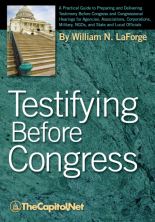From the Congressional Glossary – Including Legislative and Budget Terms
Nomination / Confirmation
What Should Have Happened at the Brett Kavanaugh Hearings
Presidential appointments to office subject to Senate confirmation per the Constitution, Article II, Section 2. Although most nominations win quick Senate approval, some are controversial and become the topic of hearings and debate. Sometimes senators object to appointees for patronage reasons – for example, when a nomination to a local federal job is made without consulting the senators of the state concerned. In some situations a senator may object that the nominee is “personally obnoxious” to her. Usually other senators join in blocking such appointments out of courtesy to their colleagues.
Appointments subject to Senate confirmation include most senior government officials and federal judges. Most commissions and promotions of officers in the armed forces, Public Health Service, National Oceanic and Atmospheric Administration, and Foreign Service are also subject to the advice and consent of the Senate.
Bork’s Impact on the Confirmation Process
The president transmits nominations for such appointments to the Senate by message, it is read, and the Senate executive clerk assigns a consecutive number to each message as it is received. Nominations are then referred to the committee with jurisdiction over the agency in which the positions exist. In some cases, a nomination may be referred to more than one committee.
Committees adopt procedures for the consideration of nominations, consistent with Senate rules, and may include those procedures in committee rules. Committees often begin their consideration of a nomination by gathering information about a nominee. About half of civilian nominations, including senior-level executive branch officials and most federal judges, are also subject to a committee hearing.
Anatomy of senate confirmation
During consideration of executive branch nominations, many committees exact a commitment from the nominee to testify before committees of Congress. This commitment is intended to strengthen congressional oversight capacity.
When the full Senate considers a nomination it does so in executive, rather than legislative, session. The Senate rarely votes to reject a nomination; unsuccessful nominations usually die from inaction.
Confirmation: Informal term for the Senate giving “Advice and Consent” to a presidential nomination for an executive or judicial position.
Also see
- Advice and Consent (CongressionalGlossary.com)
- Executive Calendar (CongressionalGlossary.com)
- Filibuster (CongressionalGlossary.com)
- Hold (CongressionalGlossary.com)
- The President’s Nominations to Federal Courts (CongressionalGlossary.com)
- Senatorial Courtesy (CongressionalGlossary.com)
- § 6.190 Holds, Clearance, and Unanimous Consent, § 8.80 Congress and the Executive: Appointments, § 8.81 Confirmation Procedure, § 8.121 Nominations to Federal Courts, § 8.160 Congress and Foreign Policy: Legislation, Appropriations, and Nominations, in Congressional Deskbook
- Chapter 8.B. Nominations in Congressional Procedure
Senate Judiciary Cmte. Vote on Judge Sotomayor’s Nomination
More
- “Obama’s Judicial Restraint,” by Jonathan Adler, The Volokh Conspiracy, May 15, 2012
- Senate Rule XXXI – Executive Session-Proceedings on Nominations
- “Constitutionality of a Senate Filibuster of a Judicial Nomination,” CRS Report RL32102 (7-page PDF
 )
) - “Evolution of the Senate’s Role in the Nomination and Confirmation Process: A Brief History,” CRS Report RL31948 (19-page PDF
 )
) - “Nomination and Confirmation of the FBI Director: Process and Recent History,” CRS Report RS20963 (8-page PDF
 )
) - “Judicial Nomination Statistics: U.S. District and Circuit Courts, 1945-1976,” CRS Report RL32122 (28-page PDF
 )
) - “Judicial Nomination Statistics: U.S. District and Circuit Courts, 1977-2003,” CRS Report RL31635 (54-page PDF
 )
) - “Judicial Nomination Statistics and Analysis: U.S. Circuit and District Courts, 1977-2022,” CRS Report R45622 (56-page PDF
 )
) - “Supreme Court Nominations, 1789 to 2020: Actions by the Senate, the Judiciary Committee, and the President,” CRS Report RL33225 (58-page PDF
 )
) - “Supreme Court Appointment Process: Senate Debate and Confirmation Vote,” CRS Report R44234 (32-page PDF
 )
) - “The Chief Justice of the United States: Responsibilities of the Office and Process for Appointment,” CRS Report RL32821 (55-page PDF
 )
) - “Supreme Court Nominations: Senate Floor Procedure and Practice, 1789-2011,” CRS Report RL33247 (53-page PDF
 )
) - “Senate Confirmation Process: A Brief Overview,” CRS Report RS20986 (8-page PDF
 )
) - Eight Mechanisms to Enact Procedural Change in the U.S. Senate, CRS Insight IN10875 (5-page PDF
 )
) - “Discharging a Senate Committee from Consideration of a Nomination,” CRS Insight IN10468 (3-page PDF
 )
)
Senate Rule 22: Executive Nominations and the Role of Debate
Courses
- Congressional Operations Briefing – Capitol Hill Workshop
- Drafting Federal Legislation and Amendments
- Writing for Government and Business: Critical Thinking and Writing
- Custom Training
- Preparing and Delivering Congressional Testimony and Oral Presentations, a Five-Course series on CD
- Congress, the Legislative Process, and the Fundamentals of Lawmaking Series, a Nine-Course series on CD
Publications

Testifying Before Congress |

Pocket Constitution |

Citizen’s Handbook to Influencing Elected Officials: A Guide for Citizen Lobbyists and Grassroots Advocates |

Congressional Procedure |
CongressionalGlossary.com, from TheCapitol.Net
For more than 40 years, TheCapitol.Net and its predecessor, Congressional Quarterly Executive Conferences, have been teaching professionals from government, military, business, and NGOs about the dynamics and operations of the legislative and executive branches and how to work with them.
Our custom on-site and online training, publications, and audio courses include congressional operations, legislative and budget process, communication and advocacy, media and public relations, testifying before Congress, research skills, legislative drafting, critical thinking and writing, and more.
TheCapitol.Net is on the GSA Schedule, MAS, for custom on-site and online training. GSA Contract GS02F0192X
TheCapitol.Net is now owned by the Sunwater Institute.
Teaching how Washington and Congress work ™

